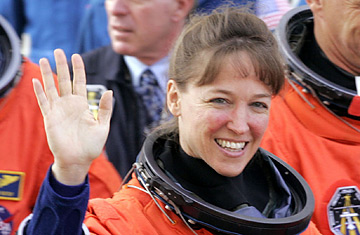
Astronaut Lisa Nowak waves prior to boarding the AstroVan en route to the orbiter at the Kennedy Space Center, Florida in July, 2006.
The review might begin by dusting off a 1998 report. Facing the prospect of lengthy missions to the international space station and beyond, NASA commissioned the study to look at how to enhance compatibility among astronaut crews. One recommendation called on NASA management to "develop and implement a psychological evaluation process as an integral part of an astronaut's annual physical examination."
"That was one of the major recommendations made," Dr. Patricia Santy, a Michigan psychiatrist and former NASA flight surgeon on the Challenger mission, told TIME. "NASA was not interested and felt that the general flight surgeon would be able to identify problems on the annual physical exam." The agency relies on the doctors and other health professionals to do the annual physical to pick up on any possible psychological problems, NASA spokesman Lynnette Madison said. If they spot a problem, the astronaut would be referred to the Johnson Space Center Behavioral Health and Performance Center.
But Santy, author of the definitive book on this issue, Choosing the Right Stuff: Psychological Selection of Astronauts and Cosmonauts, said astronauts are high-achieving individuals who tend to believe they can cope with any problem and see psychological issues as signs of weakness.
"This is a group of individuals who are hardly motivated to voice psychological problems because of the consequences of doing so," she told TIME in response to an email query. "They hate doctors in general and psychiatrists/psychologists in particular because they cannot win in any interaction with them — at best they can only 'break even.'"
The 1998 NASA report also pointed to a hole in agency's extensive space research. "Thirty years of space flight experience in this country have yielded a gold mine of data and knowledge about the human body and its response to the space environment, but no objective data on the human psyche in that same environment has been produced and many scientists consider psychological issues to be a limiting factor in the human exploration of the universe." Says Santy: "NASA has always had a lot of hubris on this issue." Perhaps no longer. Nowak's wild earthbound ride has put the spotlight on the psychological impact of space travel once more.
